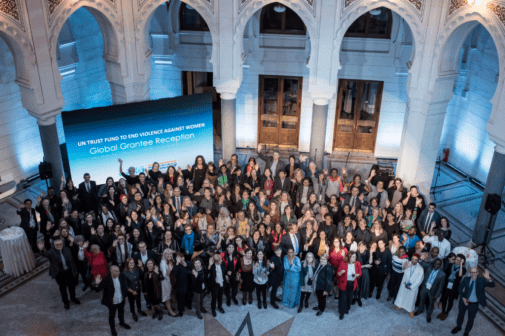
Participants gather in the City Hall in Sarajevo. Photo: UN Trust Fund / UN Women / Sulejman Omerbašić
Earlier this month I was delighted to speak at the first Global Grantee Convention organised by the UN Trust Fund to End Violence Against Women.
The Convention, which took place in Sarajevo between 4-7 November, brought together all current grantees of the UN Trust Fund to End Violence Against Women (UN Trust Fund) for the first time, along with UN teams and government and private sector partners from across the world.
I worked with the UN Trust Fund closely during my time at London College of Fashion, and so I was delighted to be able to continue this partnership in my role here at Goldsmiths. I was joined at the Convention by my colleague Siân Prime, Deputy Director for Goldsmiths’ Institute for Creative and Cultural Entrepreneurship (ICCE).
Siân and I took part in the event’s final panel discussion, which set out to examine the role of art and creativity in ending violence against women and girls. Led by UN Trust Fund Chair Aldijana Sisic, we were joined by two internationally renowned Bosnian artists Šejla Kamerić and Sandra Dukić, as well as dance professional Heather Gladding, who campaigns on gender equality in dance.


Photo: UN Trust Fund / UN Women / Sulejman Omerbašić
The Convention itself was an inspiring event: it was really thought-provoking to meet activists who have been working on a variety of projects and systems to support women and girls and minority groups across the world. There was a great sense of energy and optimism throughout the event, as well as a recognition of the complexity of the issues faced in tackling gender-based violence – particularly when navigating government agencies, funding issues and the immense work of bringing about cultural change.
There was a strong sense that the projects being supported by the UN Trust Fund are exactly the way we begin to change the conversation around gender-based violence. Siân commented: ‘The levels of innovation demonstrated by the projects were incredible and inspiring. There were examples of programmes mentoring women to secure and sustain a place in politics, and others working with police, policy makers and within the justice system to ensure women are fully supported when reporting crimes.’
On takeaways for Goldsmiths and ICCE, Siân added: ‘Our models of entrepreneurial thinking and approaches to sustainable enterprise have relevance for, and are needed by, organisations that are tackling social injustice – in this case violence against women and children.’

I certainly agree there is great potential for Goldsmiths to contribute to the important issues raised by the UN Trust Fund: whether that’s in developing online platforms for education and training around the issues of gender-based violence, building student-based projects, or collaborating on future research.
Beyond being involved with the work of the Trust Fund, the event also raised some important questions on future learning for Goldsmiths: how do we educate our students on gender-based violence? How do we best support students and staff who wish to take these issues forward and support people in our local community?
Since I joined Goldsmiths in the summer, I’ve learnt about the wide range of work being undertaken to eradicate sexual violence on our campus, including essential sexual violence briefings for staff, our Report and Support website and the Students’ Union Active Bystander training. But we know there is more work to be done.
For me, it’s clear that cross-sector collaboration is key here: it’s our work with NGOs, social enterprises and charities which will allow us to make progress on this key aspect of our social justice agenda.
Monday 25 November sees the launch of 16 Days of Activism Against Gender-Based Violence, the annual international campaign aimed at eliminating gender-based violence. Goldsmiths and Goldsmiths Students’ Union will be holding a series of events and training sessions as part of our Against Sexual Violence campaign, aimed at eradicating sexual violence on our campus. You can find out more on the Goldsmiths website and by following the campaign hashtag: #16days




